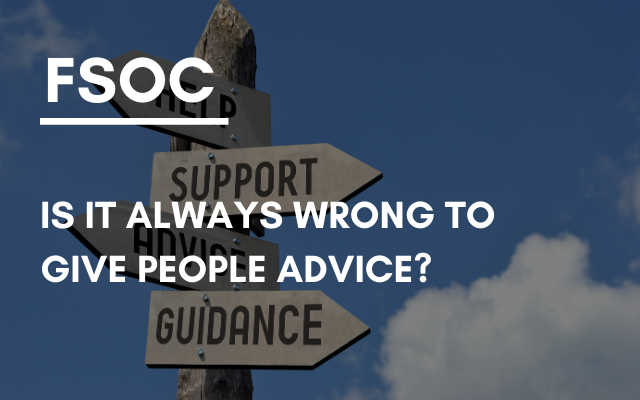FSOC – Is it always wrong to give people advice?
Released on 24th January 2020
Question: Is it always wrong to give people advice?
(Or ‘the promise that’s like crack cocaine to our insecurities’)
I just learned a new word (with thanks to Justin Owings)…
“Verschlimmbesserung” – a noun, German – for when an attempted improvement ends up making things worse.
The danger of giving advice as a coach / changeworker / government minister is twofold…
The first danger is that your client is unable to implement it.
Let’s face it – how often have you read those ‘7 top tips to lose weight / make money / get clients / find Mr right’ etc articles and gone “wow, why didn’t I think of that”…
And then *not* implemented it.
The fact is that advice is rarely acted upon.
But the second danger is far greater.
The second danger is that your client implements your advice, and it has unforeseen / unintended consequences.
Here’s an excerpt from The Little Book of Results…
DISTINCTION: Additive approaches vs subtractive understanding
In his provocative book, Antifragile, risk analyst Nassim Nicholas Taleb explains that we tend to be suckers for the additive approaches offered by how-to books, crash diets, get-rich-quick schemes etc.
For a simple example, look at the ‘top tips’ articles featured on the covers of popular magazines. . .
- The 5 keys to six-pack abs
- The 7 tips for finding Mr right
- The 5 keys to financial liberty
- 7 career moves to make you unbeatable
- The 6 secrets of successful relationships
- 7 steps to a swimsuit body
When people are looking for additive approaches, they’re asking the question, ‘What do i need to add to my life/myself/my skills/my personality to make me more X and less y?’
The structure of the additive approach is always the same:
YOU + Additive Approach = SUPER YOU
This seductive and compelling promise is like crack cocaine to our insecurities.
It’s the driver behind the billions of dollars made from ‘success’, ‘get rich quick’ and ‘how to x, y, z fast’ materials each year.
It’s why those magazines can put new tips on every cover. When we’re feeling insecure, we’re compelled by the notion of an additive approach. But there’s a problem…
Additive approaches rarely work.
In practice, additive approaches rarely deliver the hoped-for results, and can even cause actual harm.
In the USA, it’s estimated that illness caused accidentally by medical interventions is the third biggest killer after heart disease and cancer.
The 2012 arrest of 200 UK gang leaders under the banner of the government’s ‘all-out war on gangs and gang culture’ resulted in even more ruthless youngsters jockeying for position.
When you read the seven top tips, they instantly strike you as obvious (‘Why didn’t i think of that?’) and are often forgotten the next instant.
Why?
Additive advice without embodied understanding has little or no effect.
Doctors and nurses in the 1800s had to be forced to wash their hands, because they didn’t have an understanding of germ theory.
Once you understand the reality of germs, washing your hands is just common sense.
Until you understand the reality of germs, it’s just one more chore on an already long list.
This is one of the reasons why I refer to the principles behind clarity as a ‘subtractive psychology’.
Rather than giving people things to remember, practice and apply, the focus is on getting an embodied understanding of how experience is being created and on who you really are.
Understanding is subtractive…
Subtracting a misunderstanding, and getting more closely aligned with reality, has a profound effect.
Ignaz Semmelweis’ insights about the nature of germs and bacteria have resulted in a 30-year increase in the average lifespan of every person on the planet.
Seeing through this misunderstanding about how life already works has had a bigger effect on physical wellbeing than ALL medical interventions combined.
The harmful effects of the outside-in misunderstanding are infinitely more devastating than the combined benefits of every technique, methodology or psychiatric medication ever developed.
Seeing through the outside-in misunderstanding can provide enormous psychological benefit.
And as your psychology is behind all your decisions, performances and results, the impact on your life as a whole can be truly profound.
YOU – Misunderstanding = SUPER YOU
How about you?
Q: What are some of your insights / realisations that have taken things off your mind and made a big difference to you?
Big love,
Jamie
